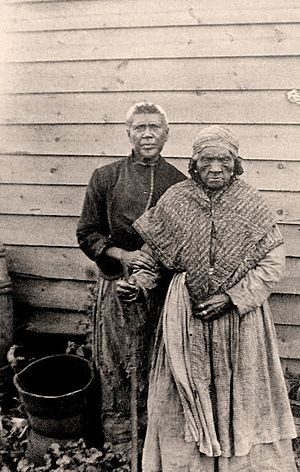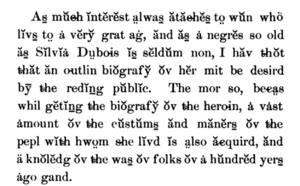Sylvia Dubois facts for kids
Sylvia Dubois (born around 1788 or 1789 – died May 27, 1888), also known as Silvia Dubois, was an African-American woman. She was born into slavery but bravely gained her freedom. She did this by standing up to her slave mistress. After becoming free, Dubois moved to New Jersey. She lived there with her children until she passed away. A doctor named C.W. Larison wrote a book about her life. It was called Silvia Dubois (Now 116 Yers Old) A Biografy of the Slav who Whipt Her Mistres and Gand Her Fredom.
Contents
Early Life as an Enslaved Person
Sylvia Dubois was born in Sourland Mountain, New Jersey. The exact year of her birth is not fully known. Sylvia herself said she was born in 1768. However, historians believe she was born later, around 1788 or 1789. Her parents were Cuffy Baird and Dorcas Compton. Her father, Cuffy, had fought in the American Revolutionary War. He had a different owner than Sylvia and her mother.
As a child, Sylvia was separated from her mother. She lived in Flagtown. When she was 14, she moved to Great Bend, Pennsylvania. This town was on the Susquehanna River. There, she worked at a tavern owned by her master, Dominicus "Minna" Dubois. While enslaved, Sylvia often did jobs usually done by men. She worked in the fields and helped ferry boats at the tavern.
A writer named Larison described Sylvia as tall and strong. He said she was about 5 feet 10 inches tall and weighed 200 pounds. He also wrote that she was hardworking and could handle a lot.
Sylvia said her master, Minna, was kind to her. But her mistress was very mean and bossy. Sylvia even called her "the very devil himself." Once, her mistress whipped her so badly that Sylvia had scars for the rest of her life.
How Sylvia Gained Freedom
In 1808, Sylvia's master, Minna, was away. He was serving on a jury in Wilkes-Barre. The mistress told Sylvia to clean the bar-room because company was coming. Sylvia did not clean it to the mistress's liking. So, the mistress hit her. Sylvia fought back and hit the mistress very hard. The mistress fell down and hit the door. At first, Sylvia thought she had killed her. Other people in the bar-room tried to step in. But Sylvia warned them not to come closer. No one dared to approach her.
After this, Sylvia ran away. She went to Chenang Point in New York. Then, she took her baby and went to Flagtown, New Jersey. She hoped to find her mother there. She learned her mother had moved to New Brunswick. Sylvia tracked her down and stayed with her for many years.
In 1812, Sylvia's grandfather bought land on Sourland Mountain. He opened a place called Put's Tavern. Sylvia built her own home near the tavern. She took care of her grandfather. After he passed away, she inherited the tavern.
Around 1840, Sylvia's tavern and home burned down. She lost her property because she could not pay her taxes.
Later Years and Passing
Sylvia's second home also burned down sometime before 1883. She spent the rest of her life living simply on Sourland Mountain. Sylvia passed away six years after Dr. Larison interviewed her. She was either 100 or 101 years old. People believe her body rests in Stoutsburg Cemetery in Sourland Mountain, New Jersey.
The Book About Sylvia Dubois
C.W. Larison wrote Sylvia Dubois' biography. He was a doctor and a former teacher. He was very interested in writing down local history. He first met Sylvia at Cedar Summit in January 1883. He interviewed her three times before publishing her book.
Larison wrote the book using his own special way of spelling. It was a phonetic orthography. This means he tried to spell words the way they sounded. Later, a historian named Jared C. Lobdell edited the book. He translated Larison's special spelling. He also wrote an introduction for a new version of the book.
Some people discuss how accurate Sylvia's stories are. Historian Lobdell suggests that Sylvia's story is a mix of history and folklore. But he says it is still valuable for understanding social history. He also questioned Sylvia's age, saying she was not 116 when interviewed. However, another professor, DoVeanna S. Fulton, believes that oral stories like Sylvia's are just as important as written history.
 | Tommie Smith |
 | Simone Manuel |
 | Shani Davis |
 | Simone Biles |
 | Alice Coachman |



